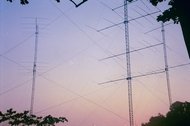30 Ham Radio Contest Tips -- Learn a single band
 This month, I’m providing a ham radio contest tip-a-day (along with other posts) to help you trigger your own contesting activities. Today’s tip: Learn a single band.Many, if not most, contests operate on a 48-hour clock. As a single operator, you may have rules that state you can only operate a certain number of those 48-hours, but there are two full days of contesting where there will be a good number of signals on the air.That is stating the obvious, of course. But this little obvious fact has some good implications -- you get two full days of activity, two cycles to learn, and two opportunities to see how things work.This is a perfect environment for learning how a single band works for propagation.A band operates differently over the course of a day and night; the full 24-hours is rarely used by an amateur radio operator to learn about how a band operates.For example, the midnight opening on 15-meters to Scandinavia from the east coast or the 4 PM long path to Japan. How 80-meters opens and closes with the grey line. Or working South America over the north pole long path.Normally in a contest, we'd rarely check all of these paths because we're too busy running on the hot band. But using the contest as an activity booster in a 48-hour time frame allows the ham operator to learn about a single band in a short period of time.If you're looking to improve your understanding of a band's propagation, enter a contest in the single band category. You'll learn about your band in a hurry.Scot, K9JY
This month, I’m providing a ham radio contest tip-a-day (along with other posts) to help you trigger your own contesting activities. Today’s tip: Learn a single band.Many, if not most, contests operate on a 48-hour clock. As a single operator, you may have rules that state you can only operate a certain number of those 48-hours, but there are two full days of contesting where there will be a good number of signals on the air.That is stating the obvious, of course. But this little obvious fact has some good implications -- you get two full days of activity, two cycles to learn, and two opportunities to see how things work.This is a perfect environment for learning how a single band works for propagation.A band operates differently over the course of a day and night; the full 24-hours is rarely used by an amateur radio operator to learn about how a band operates.For example, the midnight opening on 15-meters to Scandinavia from the east coast or the 4 PM long path to Japan. How 80-meters opens and closes with the grey line. Or working South America over the north pole long path.Normally in a contest, we'd rarely check all of these paths because we're too busy running on the hot band. But using the contest as an activity booster in a 48-hour time frame allows the ham operator to learn about a single band in a short period of time.If you're looking to improve your understanding of a band's propagation, enter a contest in the single band category. You'll learn about your band in a hurry.Scot, K9JY